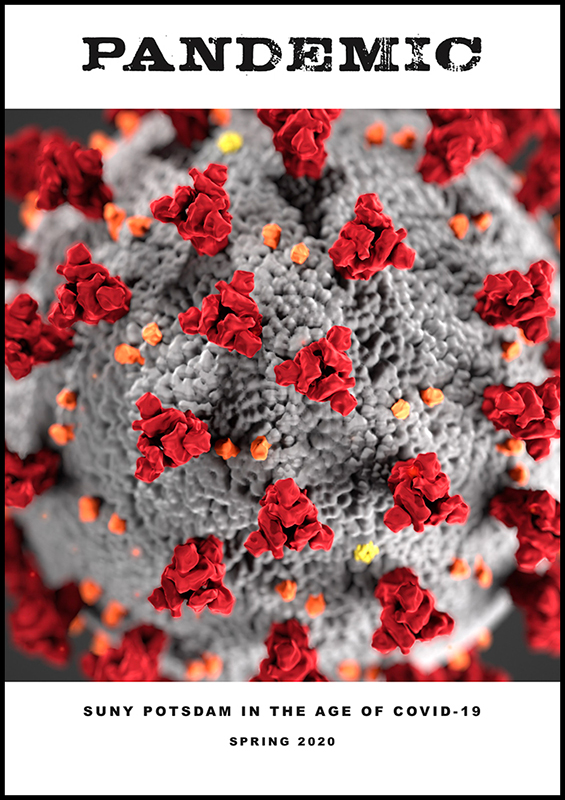Words may be the deepest form of therapy we know, and most psychologists have long held that written narrative, poetry, and song have helped to heal their makers — indeed, that disciplined, thoughtful and patient creativity may help settle our most grievous arguments with the world.
Concluding a semester like no other, SUNY Potsdam students in a magazine writing class poured their thoughts, challenges, struggles and advice into a digital publication they titled “Pandemic Magazine.” Through personal essays, reader-service pieces and participatory articles from students and several professors, the magazine documents the college experience in a time of pandemic. It is a creative and sometimes stark reminder of the role a virus is likely to play in the testament of a generation.
 “This is a time-capsule of sorts,” said SUNY Potsdam writer-in-residence Annie Stoltie, who led the article-writing class. “Throughout the semester, my students reached out to their peers and professors and others who are affected by this crisis. There’s been a lot to learn about putting a magazine together during such an uncertain time.”
“This is a time-capsule of sorts,” said SUNY Potsdam writer-in-residence Annie Stoltie, who led the article-writing class. “Throughout the semester, my students reached out to their peers and professors and others who are affected by this crisis. There’s been a lot to learn about putting a magazine together during such an uncertain time.”
Faced with the sudden pivot to online courses, Stoltie — who is the editor of Adirondack Life magazine — stuck to her previous syllabus, with one significant change. Students of her class had always created original magazines on topics of their choice, collaborating and working individually. Logistically, that level of organization is tough for an online project, Stoltie said.
Instead, the seven students of Comp 316 came together to create a single magazine.
In a piece titled “Coping,” Jamie Orlando recounts putting on a fine dinner for parents with the help of a sister. Complete with fancy clothes, strawberry cheesecake for dessert and a movie afterward, the dinner represented initiative and a rising above that brought light to dark days.
“I could sit here and ramble on about all the disappointing things I am experiencing due to COVID-19, but that will not change anything,” Orlando wrote. “Instead I can say that online college is not as horrible as I feared. I wake up at 10 every day; mind you, at Potsdam I was getting up at eight in the morning to walk to class by nine… I do homework in bed, on my couch, outside, literally wherever I want and whenever I want. I do have a heavier load of work to finish in a week than when we were still on campus, but it is not like I have much else to do. Thanks to technology, I can once again teach dance at the studio where I’ve been involved for years. I am able to do ‘lives,’ which means I not only get to educate but also interact with my students. This has made my heart and the hearts of my students feel full and thankful.”
And Rivka Rocchio, a SUNY Potsdam assistant professor of theatre and dance, has this to say about the urgent mandates of a disease whose parameters we are still struggling to understand: “In the performing arts, our pedagogy is built and flourishes around in-person, embodied dialogic exchange. We had a week to translate that pedagogy into one that works remotely. I stepped through deep phenomenological questions (and fell into quite a few rabbit holes) in relation to each of my courses and their study, like: How do we honor the loss of productions without dismissing the work of the process? What is theatre seen through a screen? How do I teach technique when I can’t see alignment, watch the class respond to cuing, or model in real time?”
The stories fill pages. Dias Barrett recalls being activated by the New York Army National Guard to respond to the COVID-19 outbreak, helping with food distribution, food pantries and the operation of testing sites. Ivory Mathieu tends to the whimsical in “Sweet Distractions,” taking on the mechanics and benefits of the oven, baking powder and measuring spoons: “Before quarantine I was never fond of baking. It took too much time to measure out ingredients, prep, and then wait for the cookies to bake. I would much rather enlist my mother to bake me something to snack on. But I have come to the realization that now that I’m independent, I can no longer coerce my parents into doing things for me…But not to worry. Tired (or lazy) college students can easily master this Tollhouse© chocolate-chip cookie recipe without sacrificing too much time.”
Mathieu concludes that cookies may not necessarily fix a broken world, and there is plenty of homework to fill the hours. Yet, “there’s nothing like something delicious to temporarily distract you from your problems.”
The magazine’s photo art depicts empty commencement chairs, a vacant performance hall, and classrooms with chairs stacked on desks. Before settling on a title, the class considered calling the publication “Six Feet Together,” a reminder of the challenges we have faced and continue to face, shoulder to shoulder — yet not quite.
Article by Bret Yager
